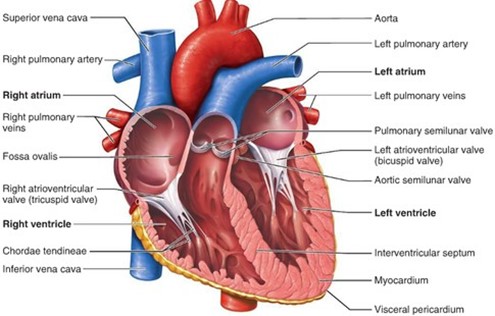The right atrium receives blood directly from:
The superior vena cava, inferior vena cava, and coronary sinus.
The superior vena cava and inferior vena cava only.
The superior vena cava, inferior vena cava, and pulmonary veins.
The pulmonary veins.
The Correct Answer is A
The right atrium receives blood directly from the superior vena cava, inferior vena cava, and coronary sinus.

The superior vena cava and inferior vena cava bring deoxygenated blood from the upper and lower body, respectively.
The coronary sinus brings blood from the heart muscle.
Choice B is wrong because it excludes the coronary sinus, which also empties into the right atrium.
Choice C is wrong because it includes the pulmonary veins, which carry oxygenated blood from the lungs to the left atrium, not the right atrium.
Choice D is wrong because it only includes the pulmonary veins, which are not connected to the right atrium at all.
Nursing Test Bank
Naxlex Comprehensive Predictor Exams
Related Questions
Correct Answer is A
Explanation
Excretion is the process of removing metabolic wastes or excrements from the body.
Metabolic wastes are substances left over from metabolic processes (such as cellular respiration) which cannot be used by the organism and must therefore be excreted.
These include nitrogen compounds, water, CO2, phosphates, sulphates, etc.
Choice B. Absorption is wrong because absorption is the process of taking in substances into the body or cells.
It is not related to the removal of waste.
Choice C. Metabolism is wrong because metabolism is the sum of all the chemical reactions that occur in an organism.
It is not a process of removing wastes, but rather producing them.
Choice D. Assimilation is wrong because assimilation is the process of incorporating substances into the body or cells.
It is also not related to the removal of waste.
Normal ranges for metabolic wastes vary depending on the type and concentration of the waste, as well as the organism and its environment.
For example, ammonia is a very toxic waste that requires a lot of water for its excretion, while uric acid is a less toxic waste that can be concentrated into a small volume.
Some normal ranges for human metabolic wastes are:
Urea: 2.5 to 6.4 mmol/L in blood serum Uric acid: 3.4 to 7.2 mg/dL in blood serum Creatinine: 0.6 to 1.2 mg/dL in blood serum CO2: 35 to 45 mmHg in arterial blood gas
Correct Answer is B
Explanation
A hormone is a secreted molecule that is carried in the bloodstream to where it acts on target cells that bear specific receptors for that hormone.
This definition is consistent with the dictionary and encyclopedia sources.
Choice A is wrong because it contradicts the definition of a hormone.
Hormones are not just any secreted molecules, but ones that have specific effects on cells with matching receptors.
Whether you are a student looking to ace your exams or a practicing nurse seeking to enhance your expertise , our nursing education contents will empower you with the confidence and competence to make a difference in the lives of patients and become a respected leader in the healthcare field.
Visit Naxlex, invest in your future and unlock endless possibilities with our unparalleled nursing education contents today
Report Wrong Answer on the Current Question
Do you disagree with the answer? If yes, what is your expected answer? Explain.
Kindly be descriptive with the issue you are facing.
